-
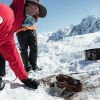 +12 +1
+12 +1Expedition finds cache of cameras on remote Yukon glacier, 85 years after mountaineer left them behind
Griffin Post's team was up against the wall, with bad weather moving in after six days of searching. With an hour to go, thanks to some quick thinking by one scientist, they recovered gear left behind by Bradford Washburn in 1937.
-
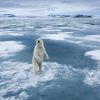 +12 +1
+12 +1Climate change is shifting polar bears’ Arctic menu, research shows
The Arctic is warming three times faster than the rest of the world. Because of that warming, some organisms are adapting by shifting their natural stomping grounds, and the region is seeing some species move in as they follow the warmth north and stick around there for longer.
-
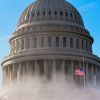 +11 +1
+11 +1U.S. House panel passes reconciliation bill protecting Arctic reserve from drilling
The House Natural Resources Committee late on Thursday passed legislation that will go into a wider budget reconciliation package that includes restoring protections for a pristine Arctic wildlife refuge from oil and gas drilling.
-
 +3 +1
+3 +1Scientist Who Spent Year at 'Epicenter' of Climate Crisis Warns World May Already Have Hit Arctic 'Tipping Point'
The atmospheric scientist that led a major year-long Arctic research expedition said Tuesday that the world may have already hit one of the so-called climate "tipping points." "The disappearance of summer sea ice in the Arctic is one of the first landmines in this minefield, one of the tipping points that we set off first when we push warming too far," said Markus Rex of the Alfred Wegener Institute, reports Agence France-Presse.
-
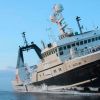 +14 +1
+14 +1A Horrible Place for an Oil Spill
In the last few days of 2018, as the Arctic archipelago of Svalbard, Norway, lay cloaked in the long darkness of polar night, a shrimp trawler called the Northguider ran aground off the coast of one of the islands.
-
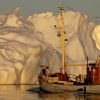 +5 +1
+5 +1The Daring Plan to save the Arctic Ice with Glass
The fear that action to combat climate change has been too slow has led some scientists to test unconventional methods to stem the loss of Arctic sea ice.
-
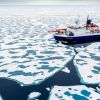 +3 +1
+3 +1The Arctic Is Shifting to a New Climate Because of Global Warming
Open water and rain, rather than ice and snow, are becoming typical of the region, a new study has found.
-
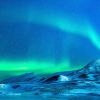 +20 +1
+20 +1Arctic transitioning to a new climate state
The fast-warming Arctic has started to transition from a predominantly frozen state into an entirely different climate, according to a comprehensive new study of Arctic conditions.
-
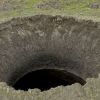 +14 +1
+14 +1The catastrophic science behind the stunning photos of Arctic crater
A 160-foot-deep crater has opened up in the Arctic permafrost. It is the result of built up methane gas released during the frost's thaw, scientists say.
-
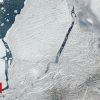 +3 +1
+3 +1Satellites capture Arctic ice shelf split
The Planet Earth-observation company has just released new imagery of the broken Milne Ice Shelf in the Arctic. Located on the northern margin of Canada's Ellesmere Island, the ice platform split on 30/31 July to form a free-floating bloc some 80 sq km (30 sq miles) in area.
-
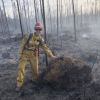 +4 +1
+4 +1Peat fires, like those raging in Siberia, will become more common in Canada | CBC Radio
A study published earlier this year showed that peatlands in Canada are drying up and that fires there will become more common in the future.
-
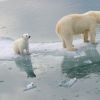 +15 +1
+15 +1Climate change: Polar bears could be lost by 2100
Scientists say we have time to save polar bears if we act now to reduce greenhouse gas emissions.
-
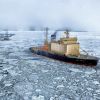 +4 +1
+4 +1A 'regime shift' is happening in the Arctic Ocean, scientists say
Scientists at Stanford University have discovered a surprising shift in the Arctic Ocean. Exploding blooms of phytoplankton, the tiny algae at the base of a food web topped by whales and polar bears, have drastically altered the Arctic's ability to transform atmospheric carbon into living matter. Over the past decade, the surge has replaced sea ice loss as the biggest driver of changes in uptake of carbon dioxide by phytoplankton.
-
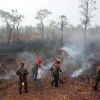 +4 +1
+4 +1Major fires hit the Amazon and the Arctic for the second year in a row [Paywall]
For the second year running, vital ecosystems are in flames. Several major fires in the Amazon have been spotted ahead of the rainforest’s typical fire season, and it seems likely that 2020 will see worse blazes than the ones which triggered international outcry last year.
-
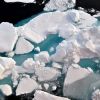 +3 +1
+3 +1Arctic Ocean acidification could reach levels far greater than predicted if emissions stay high: study
The cold waters of the planet’s north are highly susceptible to carbon absorption and under a ‘business as usual’ climate change scenario the impacts to marine ecosystems and food chains could be dire...
-
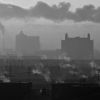 +4 +1
+4 +1Arctic records its hottest temperature ever
Alarming heat scorched Siberia on Saturday as the small town of Verkhoyansk (67.5°N latitude) reached 100.4 degrees Fahrenheit, 32 degrees above the normal high temperature. If verified, this is likely the hottest temperature ever recorded in Siberia and also the hottest temperature ever recorded north of the Arctic Circle, which begins at 66.5°N.
-
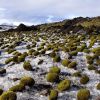 +16 +1
+16 +1Herd Of Fuzzy Green 'Glacier Mice' Baffles Scientists
Moss balls seem to roll around glaciers in a coordinated way, and researchers can't explain why the whole group moves at about the same speed and in the same direction.
-
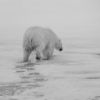 +27 +1
+27 +1NASA says Antarctica and Greenland lost enough ice to fill Lake Michigan over last 16 years
Antarctica and Greenland lost thousands of gigatons of ice in the last 16 years, according to results
-
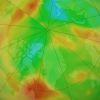 +23 +1
+23 +1Largest-ever Arctic ozone hole closes
An “unprecedented” hole in the ozone layer which developed to become the largest ever seen over the Arctic has closed just weeks after opening, scientists observing the phenomenon have said. The gap in the vital layer, which protects the Earth from harmful radiation from the sun, set a new record for ozone depletion in the northern hemisphere when it formed earlier this month.
-
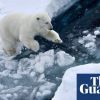 +4 +1
+4 +1Ice-free Arctic summers now very likely even with climate action
The loss of summer sea ice in the Arctic is now very likely before 2050, new research shows, even if the carbon emissions driving the climate crisis are cut rapidly. The result has alarmed scientists but they said slashing greenhouse gases remained vital as this would determine whether Arctic summer ice vanished permanently or could recover over time. If emissions remain very high, there is a risk the Arctic could be ice-free even in the dark, cold winter months, a possibility described as “catastrophic”.
Submit a link
Start a discussion




















